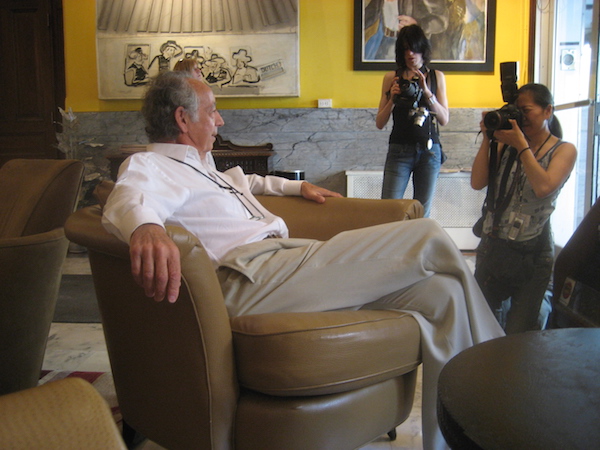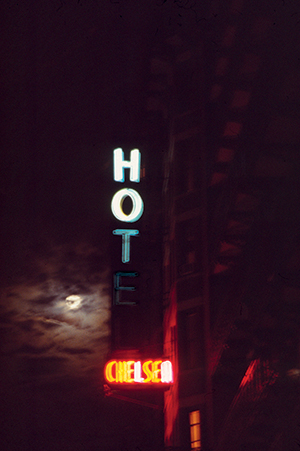
BY GERALD BUSBY | Stanley Bard, who passed away earlier this week at the age of 82, created the Chelsea Hotel as a place where artists felt welcome, had privacy, and could behave almost any way they chose. He managed the hotel like a casting director, and his choice of residents reflected an uncanny sensitivity to artists of all kinds: young and old, successful and struggling, sane and insane. There were also rich dilettantes and black sheep children from rich families who paid Stanley a lot to babysit them. The crazier the children were, the more he charged their parents.
After World War II, the Chelsea Hotel was a mecca for lost souls — a flophouse. Stanley’s father, with two other Hungarian Jews, bought it with money borrowed from the Emigrant Bank next door. Like everything else in the neighborhood back then, the hotel was rundown, and one way of restoring respectability, without remodeling, was to turn the hotel into a refuge for artists, aspiring and real. It was Stanley’s ambition and oblique artistic sensibility that actualized that idea. It took time for him to gain total control of the operations, but he did, and it succeeded wildly.
Virgil Thomson, the composer and writer, was one of the first celebrities to reside in the Chelsea Hotel. He had half of an original 11-room apartment on the southwest corner of the ninth floor, and many details of interior design from the 19th century were still there. When the hotel was built in 1883, certain apartments were meant for people with money. There were brass door knobs, cabinets with beveled glass, beautiful walnut floors, and elegant fireplaces in every room.
As Virgil’s protégé and sous-chef, I frequently visited him. To make me more available, Virgil got me an apartment in the hotel with one brief phone call to Stanley: “This is the kind of person you’re supposed to have here.” I moved in the next day with my new boyfriend, Sam Byers. I loved the atmosphere of the building, inside and out, especially the alluring and slightly sinister stairwell. Several people got stoned and committed suicide down that stairwell during my residency. The lobby and the walls of the staircase were filled with wonderful and weird paintings and a plaster of Paris fat girl sitting on a swing that hung from the ceiling. It was an only-in-New-York fantasy come to life.
My apartment had been a painter’s studio, and it had a low ceiling and a great view of the Twin Towers. I was reminded that the Chelsea Hotel was the tallest building in New York when it was built.
Stanley knew everything that was going on — if a relationship was temporary or more lasting, and what kind of people were knocking on your door at 3 a.m. He handled suicides, murders, wild drug-and-sex parties, fires, and public nudity with acceptance and authority. In fact, he really came to life at moments of crisis, and he sometimes made surprising, inappropriate remarks. When a body bag was being carried out of the hotel by the FDNY, Stanley called after them, “Maybe it’s my fault he’s dead since I gave him a kitchen.” He responded similarly to a temporary hotel guest who complained about roaches (“Never mind, I’ll give you a room without a kitchen.”).
Stanley was like an awkward but smart relative who insisted on a personal, almost intimate relationship with everyone. No tenant got a lease after the first year. From that point on, it was your job to stay on Stanley’s good side. The less money and fame you had, the more games he played with you. He was penny-pinching in practical matters, but also generous if you couldn’t pay your rent for a few months. One way he reminded me of past-due rent was to suddenly leap in the elevator as the door closed. There I was, face to face with Stanley, just him and me. “You need to pay your rent,” he said to me with anxious intensity.
He didn’t mind embarrassing you. When I once walked past the front desk, he yelled, “Where’s your rent?” He did the same to Viva one morning as she stepped off the elevator. She stopped, slowly turned around and shouted back, “F**k you. You don’t deserve any rent for the hellhole you’ve given me and my daughter to live in.”

Some longtime residents had running battles with Stanley about the plumbing, the house phones, or a broken window that needed repair. Everything was done or not done on the basis of how he felt about you at the moment, and his employees acted the same way. They never made dates with residents to fix things. You had to catch them at the right time, when they were in the mood.
The housemaids and Doris, who was the overlord of the basement and did the laundry, knew all Stanley’s ploys and schemes. They would disappear in the caverns beneath the Chelsea when he came looking for them. They also liked to embarrass Stanley when he was giving distinguished guests a tour of the hotel. “Where’s Doris?” he asked a maid who got on the elevator during one of these tours. “I don’t know. Maybe she went to the bathroom.”
Arthur Miller wrote a charming essay called “The Chelsea Affect” that described some of Stanley’s midnight maneuvers, like hiring non-union workers to install carpeting in unoccupied rooms. Stanley had lots of secrets, and they frequently involved the tenants. We all encountered the need to get something fixed or replaced. Our complaints often were met with hazy, uncertain responses. Stanley was a double-talker, and most of us never really understood exactly what he was saying. Jerry Weinstein, who was the principal desk clerk, was in on most secrets and made jokes about them. “Where’s Denise?” I once asked him, looking for the maid. “Maybe she’s with de nephew,” he snapped back.
Stanley’s manner of dealing with his business partners, some of whom were relatives, was apparently no less vague. The Chelsea Hotel was his baby, and he wanted to control everything — and to make deals he didn’t tell them about. His partners finally got the upper hand, and sold the hotel. Stanley and his son David, designated to take over the management, were summarily removed from the building the day the deal was consummated. Stanley’s fantasy was over, and the spirit that Stanley had created dissipated. The art hanging on the walls in the lobby, and along the famous stairwell, mysteriously began to disappear. Most famous among them was Larry Rivers’ “Dutch Masters,” and considerable litigation instigated by the Larry Rivers Foundation quickly ensued.
In spirit, Stanley died when he was forced out. He once attended one of our tenant association meetings at El Quijote, but his eyes showed him not to be totally present. We all greeted him warmly and told him we missed him. “I’ve got plans,” he told me when I asked how he was. I hope he died happy.
Gerald Busby is a longtime resident of the Chelsea Hotel and protégé of Virgil Thomson. He is best known for his film score for Robert Altman’s “3 Women” and his dance score for Paul Taylor’s “Runes.” With Craig Lucas, Busby is currently writing an opera based on “3 Women.” Visit geraldbusby.com.
For more on Bard, visit Chelsea Hotel resident Ed Hamilton’s blog.


































